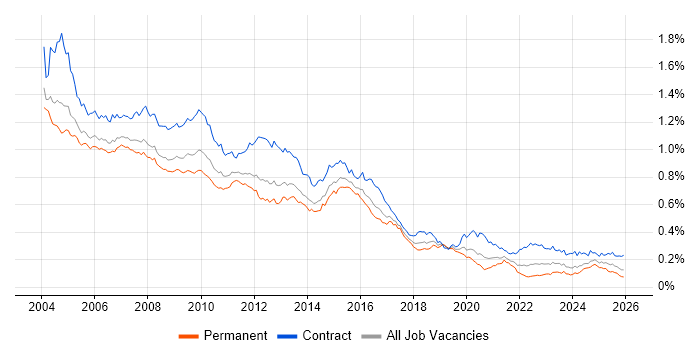Oracle Developer
UK > England
The median Oracle Developer salary in England is £67,500 per year, according to job vacancies posted during the 6 months leading to 1 May 2025.
The table below provides salary benchmarking and summary statistics, comparing them to the same period in the previous two years.
| 6 months to 1 May 2025 |
Same period 2024 | Same period 2023 | |
|---|---|---|---|
| Rank | 596 | 771 | 873 |
| Rank change year-on-year | +175 | +102 | +160 |
| Permanent jobs requiring an Oracle Developer | 52 | 51 | 78 |
| As % of all permanent jobs advertised in England | 0.11% | 0.060% | 0.084% |
| As % of the Job Titles category | 0.13% | 0.063% | 0.092% |
| Number of salaries quoted | 41 | 27 | 51 |
| 10th Percentile | £55,000 | £37,500 | £47,500 |
| 25th Percentile | £62,500 | £51,250 | £52,375 |
| Median annual salary (50th Percentile) | £67,500 | £67,500 | £62,500 |
| Median % change year-on-year | - | +8.00% | +13.64% |
| 75th Percentile | £75,000 | £71,250 | £71,250 |
| 90th Percentile | £80,000 | £72,250 | £72,500 |
| UK median annual salary | £67,500 | £67,500 | £62,500 |
| % change year-on-year | - | +8.00% | +13.64% |
All Permanent IT Job Vacancies
England
For comparison with the information above, the following table provides summary statistics for all permanent IT job vacancies in England. Most job vacancies include a discernible job title that can be normalized. As such, the figures in the second row provide an indication of the number of permanent jobs in our overall sample.
| Permanent vacancies in England with a recognized job title | 41,506 | 80,486 | 84,681 |
| % of permanent jobs with a recognized job title | 90.13% | 94.46% | 91.53% |
| Number of salaries quoted | 24,507 | 60,251 | 53,657 |
| 10th Percentile | £30,000 | £28,500 | £32,500 |
| 25th Percentile | £42,500 | £38,250 | £45,000 |
| Median annual salary (50th Percentile) | £57,500 | £53,773 | £60,567 |
| Median % change year-on-year | +6.93% | -11.22% | +0.95% |
| 75th Percentile | £75,000 | £72,000 | £82,500 |
| 90th Percentile | £97,500 | £91,250 | £100,000 |
| UK median annual salary | £57,500 | £52,777 | £60,000 |
| % change year-on-year | +8.95% | -12.04% | - |
Oracle Developer
Job Vacancy Trend in England
Job postings that featured Oracle Developer in the job title as a proportion of all IT jobs advertised in England.

Oracle Developer
Salary Trend in England
3-month moving average salary quoted in jobs citing Oracle Developer in England.
Oracle Developer
Salary Histogram in England
Salary distribution for jobs citing Oracle Developer in England over the 6 months to 1 May 2025.
Oracle Developer
Job Locations in England
The table below looks at the demand and provides a guide to the median salaries quoted in IT jobs citing Oracle Developer within the England region over the 6 months to 1 May 2025. The 'Rank Change' column provides an indication of the change in demand within each location based on the same 6 month period last year.
| Location | Rank Change on Same Period Last Year |
Matching Permanent IT Job Ads |
Median Salary Past 6 Months |
Median Salary % Change on Same Period Last Year |
Live Jobs |
|---|---|---|---|---|---|
| South East | +119 | 30 | £67,500 | - | 32 |
| North of England | +83 | 8 | £75,000 | +76.47% | 22 |
| Midlands | +87 | 7 | £60,000 | - | 21 |
| North West | +31 | 6 | £72,500 | +45.00% | 12 |
| London | +103 | 5 | £70,000 | -5.08% | 43 |
| East Midlands | +53 | 4 | £58,750 | - | 7 |
| West Midlands | +52 | 3 | £73,750 | - | 12 |
| Yorkshire | +75 | 2 | £75,000 | +106.90% | 8 |
| South West | +102 | 1 | - | - | 12 |
| East of England | - | 1 | £50,000 | - | 13 |
| Oracle Developer UK |
|||||
Oracle Developer Skill Set
Top 30 Co-occurring Skills and Capabilities in England
For the 6 months to 1 May 2025, Oracle Developer job roles required the following skills and capabilities in order of popularity. The figures indicate the absolute number co-occurrences and as a proportion of all permanent job ads across the England region featuring Oracle Developer in the job title.
|
|
Oracle Developer Skill Set
Co-occurring Skills and Capabilities in England by Category
The follow tables expand on the table above by listing co-occurrences grouped by category. The same employment type, locality and period is covered with up to 20 co-occurrences shown in each of the following categories:
